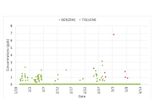Gas Pipeline Leak Detection
Articles & Whitepapers
-
Fenceline Monitoring of Benzene in Refineries Using OMNI-2100 - Case Study
Background: According to the Environmental Protection Agency (EPA)1, undetected leaks (aka fugitive emissions) are a significant source of pollution and can emanate from industry, refineries, energy production, and natural gas pipelines. Fixing these leaks can protect workers and nearby communities, reduce operating costs for companies, and assist regulators with implementing source emissions ...
-
The Importance of Confined Space Training for Your Employees
A confined space is an area large enough for a person to enter but has a small or restricted entrance or exit and isn’t intended for human habitation. Contrary to popular belief, confined ...
News
-
Gas leaks fuel climate change
A leading authority on the effects of methane in the atmosphere has called for a new drive to cut gas leaks from pipelines and wells. Euan Nisbet, professor of Earth sciences at Royal Holloway, University of London, says that ever more sensitive ...
Cleanup underway for nearly 3M-gallon saltwater spill in ND
Colorado flooding triggers oil spills, shutdowns
Detecting gas leaks can reduce costs and minimise dangers
Picarro Unveils the Industry´s First Real-Time Mobile Geo-Informatics Platform for Quantifying Methane Emissions Across Natural Gas Production Fields
Equipment & Solutions
-
Showcase
Gas Leak Detector
When house owners notify the network operator or fitter that they can clearly smell gas in the house, a highly explosive gas concentration may already be present (4–17%). The fitter has to use a gas detector to check sections of gas pipes for leak tightness to locate possible leaks.






